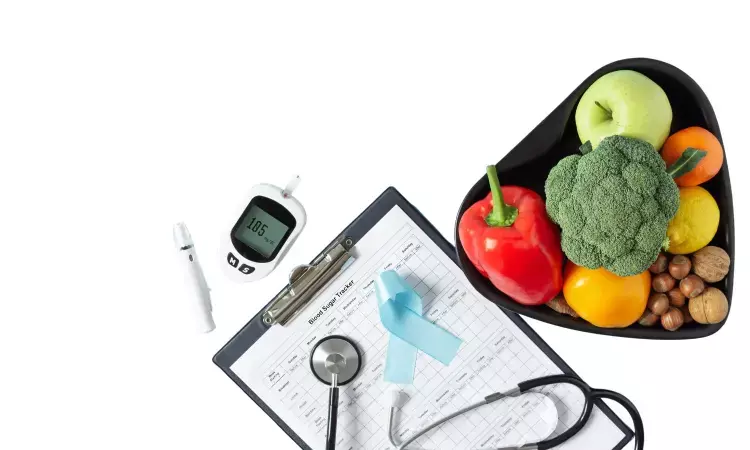- Home
- Medical news & Guidelines
- Anesthesiology
- Cardiology and CTVS
- Critical Care
- Dentistry
- Dermatology
- Diabetes and Endocrinology
- ENT
- Gastroenterology
- Medicine
- Nephrology
- Neurology
- Obstretics-Gynaecology
- Oncology
- Ophthalmology
- Orthopaedics
- Pediatrics-Neonatology
- Psychiatry
- Pulmonology
- Radiology
- Surgery
- Urology
- Laboratory Medicine
- Diet
- Nursing
- Paramedical
- Physiotherapy
- Health news
- Fact Check
- Bone Health Fact Check
- Brain Health Fact Check
- Cancer Related Fact Check
- Child Care Fact Check
- Dental and oral health fact check
- Diabetes and metabolic health fact check
- Diet and Nutrition Fact Check
- Eye and ENT Care Fact Check
- Fitness fact check
- Gut health fact check
- Heart health fact check
- Kidney health fact check
- Medical education fact check
- Men's health fact check
- Respiratory fact check
- Skin and hair care fact check
- Vaccine and Immunization fact check
- Women's health fact check
- AYUSH
- State News
- Andaman and Nicobar Islands
- Andhra Pradesh
- Arunachal Pradesh
- Assam
- Bihar
- Chandigarh
- Chattisgarh
- Dadra and Nagar Haveli
- Daman and Diu
- Delhi
- Goa
- Gujarat
- Haryana
- Himachal Pradesh
- Jammu & Kashmir
- Jharkhand
- Karnataka
- Kerala
- Ladakh
- Lakshadweep
- Madhya Pradesh
- Maharashtra
- Manipur
- Meghalaya
- Mizoram
- Nagaland
- Odisha
- Puducherry
- Punjab
- Rajasthan
- Sikkim
- Tamil Nadu
- Telangana
- Tripura
- Uttar Pradesh
- Uttrakhand
- West Bengal
- Medical Education
- Industry
Intensive Food-as-Medicine Program fails to improve Glycemic control in diabetes patients: JAMA

The growing prevalence of food-as-medicine programs necessitates robust evidence to assess their impact on health.
A recent JAMA Internal Medicine concluded that an intensive food-as-medicine program boosts engagement in preventive health care. Still, it didn't enhance glycemic control compared to standard care among adult participants. Programs for people with high biomarkers need a control group to show effectiveness. More research is required to develop food-as-medicine programs promoting better health outcomes.
This study determined if an intensive food-as-medicine program for diabetes patients and food insecurity can improve glycemic control and affect healthcare use. The study was conducted as a stratified randomized clinical trial with a waitlist design from April 19, 2019, to September 16, 2022. Participants were followed for one year and were randomly assigned to either the treatment group, which participated in the program immediately, or the control group, which waited six months. The trial took place at two sites, one rural and one urban. To be eligible for the study, participants required a T2D diagnosis, HbA1c level of 8% or higher, food insecurity, and residence within the service area of the participating clinics.
The program offered healthy groceries for ten meals/week, plus consultations, evaluations, coaching, and diabetes education for a year. The primary outcome was HbA1c at six months, with secondary outcomes including biometric measures, healthcare use, and self-reported diet/healthy behaviours at 6 and 12 months
The summary of this study includes the following points:
· Of 3712 patients assessed, 3168 were contacted, 1064 were deemed eligible, 500 consented and were randomized, and 465 patients completed the study.
· Of these, 349 patients had laboratory test results at six months. Both treatment and control groups experienced a decline in HbA1c levels, resulting in a non-significant adjusted mean difference of -0.10.
· Access to the program increased preventive health care, including more dietitian visits, active prescription drug orders for metformin and glucagon-like peptide one medication, and participants reporting improved diets.
This clinical trial showed that an intensive food-as-medicine program improved engagement with preventive health care but didn't affect glycemic control compared to usual care. Control groups are necessary to demonstrate effectiveness in programs targeting individuals with elevated biomarkers. More research is needed to design food-as-medicine programs that improve health.
Reference:
Doyle J et al.Effect of an Intensive Food-as-Medicine Program on Health and Health Care Use: A Randomized Clinical Trial. JAMA Intern Med.
BDS, MDS in Periodontics and Implantology
Dr. Aditi Yadav is a BDS, MDS in Periodontics and Implantology. She has a clinical experience of 5 years as a laser dental surgeon. She also has a Diploma in clinical research and pharmacovigilance and is a Certified data scientist. She is currently working as a content developer in e-health services. Dr. Yadav has a keen interest in Medical Journalism and is actively involved in Medical Research writing.
Dr Kamal Kant Kohli-MBBS, DTCD- a chest specialist with more than 30 years of practice and a flair for writing clinical articles, Dr Kamal Kant Kohli joined Medical Dialogues as a Chief Editor of Medical News. Besides writing articles, as an editor, he proofreads and verifies all the medical content published on Medical Dialogues including those coming from journals, studies,medical conferences,guidelines etc. Email: drkohli@medicaldialogues.in. Contact no. 011-43720751


